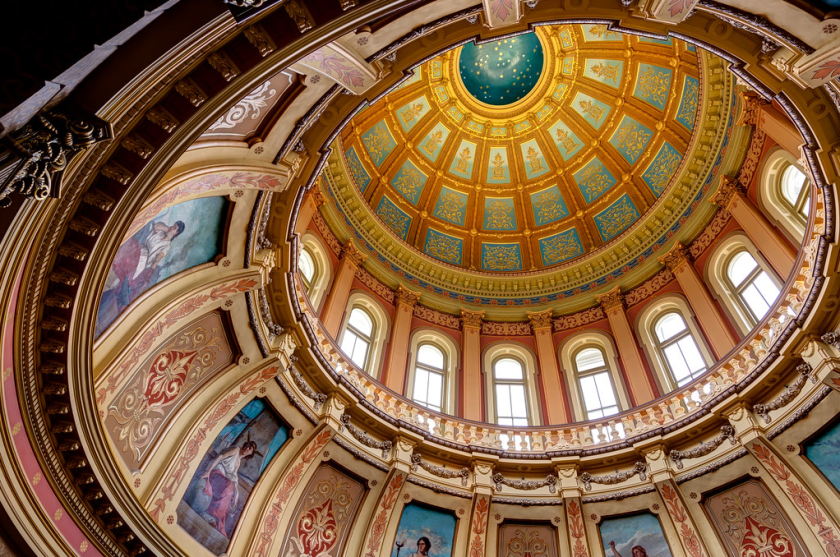Waterfalls dominate the conventional wisdom. “As politics becomes a form of mortal combat,” journalist Thomas B. Edsall has contended, it has led voters in both political parties to “see their adversaries as worthless.” We’ve reached the point, he wrote, where “loathing motivates voters more than loyalty,” from the top down. He quotes political scientists Alan Abramowitz and Steven Webster, who wrote that “the famous comment by the late Tip O’Neill that ‘all politics is local’ now seems rather quaint. In the 21st century United States, it increasingly appears that all politics is national.”
But it seems to me that the reverse is true. Politics in the U.S. increasingly behaves like a collection of volcanoes, with issues building up below the surface of the polity only to erupt at the state and local level and then explode onto the national scene.
That’s certainly the case for the culture wars. Even a reference to the movie Frozen II didn’t save a Nebraska mom from loud boos when she made a case for a mask mandate in her daughter’s school. This and similar conflicts have popped up around the country, and they’ve led to threats — including death threats — against more than 200 local school officials, by Reuters’ count.
More and more, the fights are over books. The chair of the governing board in Llano County, in the beautiful Hill Country of Texas, received an email with the subject “Pornographic Filth at the Llano Public Libraries.” The message’s author, Bonnie Wallace, pointed to the late Maurice Sendak’s In the Night Kitchen, a Caldecott award winner that was the recipient of seven different best-book recognitions and was translated into more than 40 languages. Wallace found In the Night Kitchen objectionable because its main character, a young boy, appeared nude in the book. She demanded that it be removed from the kids’ section of the library.
The new battlefront over censorship, the Washington Post reported, has become “your public library.” Local residents, some of whom didn’t even hold a library card, have argued for moving some popular children’s books to the adult section or hiding them behind the librarian’s counter. Some librarians have been fired. In other libraries, some books have simply disappeared.
Then there’s the unlikely battle against Mickey Mouse and his friends. The Walt Disney Co. has found itself caught in a fierce Florida battle over what teachers can — and can’t — say about LGBTQ issues, including over the new state law, dubbed “Don’t Say Gay” by its critics, that prohibits teachers from introducing subjects like gender identity or sexual orientation for kids younger than fourth grade. Some conservative writers pounced on the mouse, with one arguing that “Disney isn’t just grooming children with radical sexual propaganda — now they’re bragging about it.” Protesters carried signs urging “Boycott Disney” and “Disney Stop Sexualizing Our Kids” outside the company’s studios in Los Angeles.
These mega-issues are bubbling up from local volcanoes onto the national scene — how else to explain Los Angeles demonstrators protesting Disney’s decisions in Orlando? If the Republicans take control of Congress in the fall midterms, conservatives like Reps. Jim Banks of Indiana, Matt Gaetz of Florida and Lauren Boebert of Colorado have threatened to stop the renewal of Disney’s copyright of Mickey Mouse when it expires in 2024. What detractors have called the “Mickey Mouse Protection Act” could be in big trouble.
Of course, the left has energetically developed its own national policy agenda in the states, and nowhere has that been a hotter issue than in California. For the last generation, the state has been the center of many of the country’s most aggressive environmental initiatives, from the catalytic converter to the growth of electrically powered cars. California has used a waiver to the Clean Air Act to slash emissions standards, and 13 other states have followed the state’s benchmarks. California led the charge as well against the Trump administration’s plans to open more national forests to logging.
President Trump encountered the biggest challenges to his Muslim travel ban from the states, especially Washington and California. When the country faced a battle against COVID-19, Seattle set policies that much of the rest of the nation came to follow. The city went from having the highest COVID-19 death rate in the country to the lowest of any major metro area.
During the Trump administration, California ironically became “a poster child for states’ rights,” as two Christian Science Monitor reporters put it. The state, along with allies, especially in the West, fought against the Trump administration on health policy and transportation plans as well as the battles on immigration and tailpipe emissions. More than one liberal found comfort in states’ power. If not for their ability to outmaneuver the feds on key issues, they argued they would have been run over by the Trump administration’s policies.
Ward Scott, a policy adviser to the Western Governors’ Association, called this a case of “fair-weather federalism,” where national officials favor the work of the states when they agree — and battle against it when they don’t. “For the party out of power there’s often a kind of discovery of federalism because it gives a greater chance of getting what you want,” explained Barry Rabe, a public policy professor at the University of Michigan’s Ford School.
These days, that discovery is happening most at the state and local levels. Conservatives have found that they can test and advance their agenda in city councils, school boards and state legislatures. Liberals, disappointed by Washington gridlock, have selectively launched their own eruptions. Either way, policy is jetting up from the states like a landscape of volcanoes. These local flows of red-hot lava represent both an outburst of local passions and the careful cultivation of messages — and messengers — being test-marketed for the national stage.
Governing's opinion columns reflect the views of their authors and not necessarily those of Governing's editors or management.
Related Content














